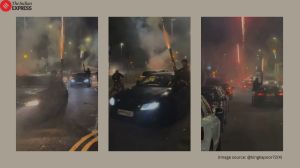Scholars turn to Gandhian principles to check terrorism
The need for emulating Gandhian principles amid concerns on growing violence and acts of terror dominated the first day of the 83rd session of the Indian Philosophical Congress (IPC) at Gujarat Vidyapeeth here on Wednesday.

Day-I of the 83rd session of Indian Philosophical Congress at Gujarat Vidyapeeth
The need for emulating Gandhian principles amid concerns on growing violence and acts of terror dominated the first day of the 83rd session of the Indian Philosophical Congress (IPC) at Gujarat Vidyapeeth here on Wednesday.
In the inaugural session, Gujarat Vidyapeeth Chancellor Sudarshan Iyengar pointed out that while the growth of consumerism is eating into the fabric of social ethics, “the social values are also greatly threatened by the rising greed of individuals, which is one of the basic causes of conflicts”.
Dr Iyengar inter-related the principles of anasakti (non-attachment) as explained in the Gita with the Gandhian ideology. He said the values like satya (truth), ahimsa (non-violence), brahmacharya (celibacy) can still provide a healing touch to the ailing humanity.
IPC general president Prof I N Sinha, in his address, stressed on the importance of ethics and values in countering the problems of terrorism and corruption. He also emphasised on the fact that the process of inculcating ethical values has to be initiated at the individual level and only then can it effectively reflect as a social way of life.
Sessions were divided into five broad categories, including history of philosophy, logic and scientific methods, metaphysics and epistemology, ethics and social philosophy and religion. Papers were presented on subjects as diverse as carvaka and materialism to memory consolidation research in cognitive neuroscience, to Kundalini Yoga and Hasya Yoga to more contemporary subjects like ethical scepticism.
Reflecting social concerns, philosophers also discussed subjects such as untouchability and corruption. M Prasada Rao ICPR/ JRF Research Scholar, Department of Philosophy and Religious Studies, Andhra University, Visakhapatnam, elaborated how the present caste system in India is different from the Varna System of ancient India. Bindu K L, Research Scholar Department of Philosophy, Karyavattom Campus, Thiruvanathapuram, outlined how the term Dalit, which basically stands for the poor or oppressed, has come to signify socio-economic exploitation of a certain section cutting across religious lines across South Asia.
The concluding session of the day had a colloquium on Gandhi and Peace. Panellists maintained that Gandhi and his experiments still remain valid at the backdrop of growing social conflicts and unrest.
“While human beings as a biological existence have myriad conflicts inherent in them, can a law of non-violence be an answer to man’s problems?” asked Professor R C Pradhan from University of Hyderabad.
“Gandhi, unlike the cynics viewed history as victory of non-violence and truth, when others saw onslaught of violence in pages of history,” Pradhan said. “It is this optimism of Gandhi, which still keeps him relevant in the modern time of growing conflicts,” he added.
“While there have been tremendous developments in all spheres of humanity over the years, conflicts and violence have, however, continued to grow exponentially,” observed Prof Manjulika Ghosh. “To address the crisis, one has to resort to ahimsa as talked about by Mahatma Gandhi, who turned the concept from a means of personal salvation to a tool of conflict resolution at the socio-economic sphere,” she added.





- 01
- 02
- 03
- 04
- 05


























